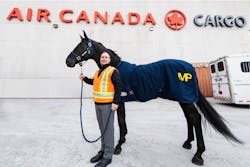Air Canada’s Strategy to Improve Animal Handling
Air Canada in 2018 became the first airline to be awarded IATA Center of Excellence for Independent Validators (CEIV) for Live Animals Logistics certification and in 2022 became first airline to be recertified.
“CEIV Live Animals certification identifies companies that comply with IATA's Live Animals Regulations, operate to the highest standards in all countries they serve, and are proactive in how airlines review and implement changes to their internal standards. Being CEIV certified is important to Air Canada Cargo because it ensures that we maintain the highest standards, and evolve with the industry that is constantly progressing,” says Janet Wallace, managing director of cargo operations and transformation.
Air Canada Cargo is the cargo service subsidiary of Air Canada. Typically, Air Canada Cargo would not assist with pets in the cabin (commonly known as PETC).
However, Wallace says Air Canada Cargo works collaboratively between the various departments to find solutions for customers.
For example, Wallace says customers cannot take their pets into Great Britain as baggage or in the cabin, they must travel as cargo.
“Our colleagues on the passenger side will refer customers to Air Canada Cargo along with the booking references so we can ensure the animals are booked on the same flight to minimize disruption,” she says.
Conversely, Air Canada Cargo has reached out to the passenger side for support. In 2017 a wayward oriole needed to travel from Ontario back home to British Columbia, Wallace recalls.
“We carried the oriole in the cabin, with an attendant, to minimize any further distress on the bird,” she says.
Employees who handle animals are specially trained.
“All Air Canada Cargo employees who handle live animals receive standard cargo training based on their role (booking, acceptance, handling, transportation) – which includes an IATA-compliant live animal training program with a three-year recurrence,” Wallace says. “When it comes to ground handlers, we perform an assessment of the capabilities before allowing live animals to travel to a specific station or to be handled by a specific ground handler on our behalf.”
In November 2022, Air Canada Cargo introduced a specialized service for equine transportation utilizing Boeing 767-300 freighters. Stalls, provided by Unilode and manufactured by VRR, were specifically designed to transport horses and have room for three horses per unit.
Air Canada Cargo’s first equine transport was Noble, a gift from the Royal Canadian Mounted Police to King Charles III in March, ahead of his coronation ceremony.
“Having been the airline of choice to ship such an amazing gift for a King was an honor. This milestone in our company's history was also shared with the launch of our Livestock Program. The planning and collaboration between all departments was amazing to see. Everyone came together to not only support the launching of this program, but also to ensure all the planning was taken care of to support the safe transport of the King's horse,” Wallace says.
The transportation of horses by air presents unique challenges and planning. Wallace says stations must have the proper equipment, the correct number of stalls, available aircraft and an alternate plan to pre-empt unforeseen circumstances.
In April, Schoona, a green sea turtle in a special crate was flown from across Canada to Ripley’s Aquarium of Canada in Toronto. Air Canada Cargo has a presence in over 50 countries and self-handled hubs in Montreal, Toronto, Vancouver, Chicago, London, and Frankfurt. Given Air Canada Cargo's extensive network, Wallace says aquariums and zoos use Air Canada Cargo for specialty moves.
From alligators and pandas to tigers, she says, “Each move is unique and requires extensive work with the zoo to ensure the safety and well-being of the animal at all times. For any comfort stops, we partner with a third zoo to ensure the animals are provided with food and water.”
To ground service providers and cargo service providers, Wallace says the key to success is investing in a quality management system: “It is a long-term investment that requires a continuous focus on quality in order to achieve the certification – and benefits. Benefits realization and quality go hand in hand – once you have a system to continuously manage quality, the benefits of certification can be realized.”
About the Author
Rebecca Kanable
Assistant Editor
Rebecca Kanable, a veteran journalist, worked with Endeavor Business Media's aviation group from 2021 to 2024 as assistant editor of Airport Business, AMT and Ground Support Worldwide. She previously worked for various publications, including trade magazines and newspapers.

